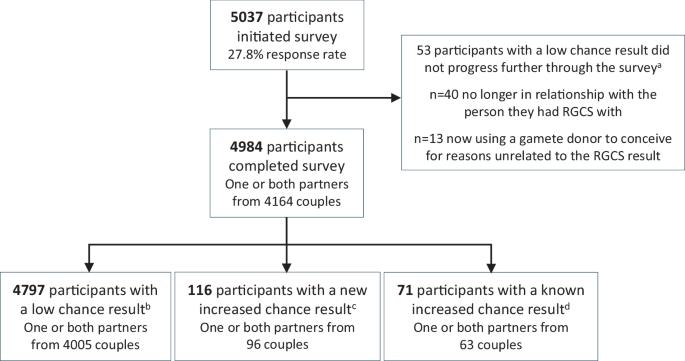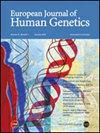修订生殖故事:生殖基因携带者筛查后12个月的心理社会和生殖影响。
IF 4.6
2区 生物学
Q2 BIOCHEMISTRY & MOLECULAR BIOLOGY
引用次数: 0
摘要
负责任地实施生殖遗传载体筛查(RGCS)涉及了解结果的长期社会心理和生殖影响。这项混合方法的研究在“麦肯齐的使命”中检验了这些影响。“麦肯齐的使命”是一项澳大利亚范围内的研究,该研究为10000对育儿期夫妇提供了1280个基因的基于夫妇的RGCS。对入组时和12个月后完成的参与者调查数据进行分析。对结果概率较高的参与者进行了采访。采用以解释性描述为指导的反身性主题分析。4948名参与者(27%应答)完成了12个月后的结果调查。大多数人有最小的决策后悔(中位数≤5,0 =无后悔,100 =高后悔)和高生育信心。发现有增加机会结果的参与者焦虑升高(n = 116,中位数= 39 / 80,临床意义≥40)。受访者(N = 19,来自16对夫妇)认为他们增加的生育机会“改变了他们生育计划的一切”。虽然修改自己的生育计划是一段情感上复杂的“旅程”,但参与者对这些信息“心存感激”。“生殖故事”的概念被用来解释结果。生殖故事指的是一个人对为人父母的期望,如果改变,可能会导致心理上的痛苦。接受一个增加的机会结果扰乱了生殖故事。结果出来12个月后,大多数几率增加的人觉得自己有能力修改自己的生育故事,但焦虑情绪却有所上升。研究结果表明,需要建立rgcs后社会心理支持的纵向模型。本文章由计算机程序翻译,如有差异,请以英文原文为准。

Revising the reproductive story: psychosocial and reproductive impacts 12 months after reproductive genetic carrier screening
The responsible implementation of reproductive genetic carrier screening (RGCS) involves understanding the long-term psychosocial and reproductive impacts of results. This mixed-methods study examined these impacts within ‘Mackenzie’s Mission’, an Australia-wide study that offered couple-based RGCS for >1280 genes to 10,000 reproductive couples. Data from participant surveys completed at enrolment and 12 months post-result were analysed. Participants with an increased chance result were interviewed. Reflexive thematic analysis, guided by Interpretive Description was used. 4948 participants (27% response) completed the 12 month post-result survey. Most had minimal decision regret (median ≤5, 0 = no regret, 100 = high regret) and high reproductive confidence. Participants found to have an increased chance result had elevated anxiety (n = 116, median = 39 out of 80, clinically meaningful is ≥40). Interviewees (N = 19, from 16 couples) felt their increased chance result “change[d] everything” about their reproductive plans. Although revising their reproductive plan was an emotionally complex “journey”, participants were “grateful” for the information. The concept of the ‘Reproductive Story’, was used to interpret the results. A reproductive story refers to a person’s expected narrative about parenthood that, if altered, can cause psychosocial distress. Receiving an increased chance result disrupts the reproductive story. By 12 months post-result, most people with an increased chance result felt empowered to revise their reproductive story, but anxiety was elevated. Findings suggest a need for longitudinal models of post-RGCS psychosocial support.
求助全文
通过发布文献求助,成功后即可免费获取论文全文。
去求助
来源期刊

European Journal of Human Genetics
生物-生化与分子生物学
CiteScore
9.90
自引率
5.80%
发文量
216
审稿时长
2 months
期刊介绍:
The European Journal of Human Genetics is the official journal of the European Society of Human Genetics, publishing high-quality, original research papers, short reports and reviews in the rapidly expanding field of human genetics and genomics. It covers molecular, clinical and cytogenetics, interfacing between advanced biomedical research and the clinician, and bridging the great diversity of facilities, resources and viewpoints in the genetics community.
Key areas include:
-Monogenic and multifactorial disorders
-Development and malformation
-Hereditary cancer
-Medical Genomics
-Gene mapping and functional studies
-Genotype-phenotype correlations
-Genetic variation and genome diversity
-Statistical and computational genetics
-Bioinformatics
-Advances in diagnostics
-Therapy and prevention
-Animal models
-Genetic services
-Community genetics
 求助内容:
求助内容: 应助结果提醒方式:
应助结果提醒方式:


